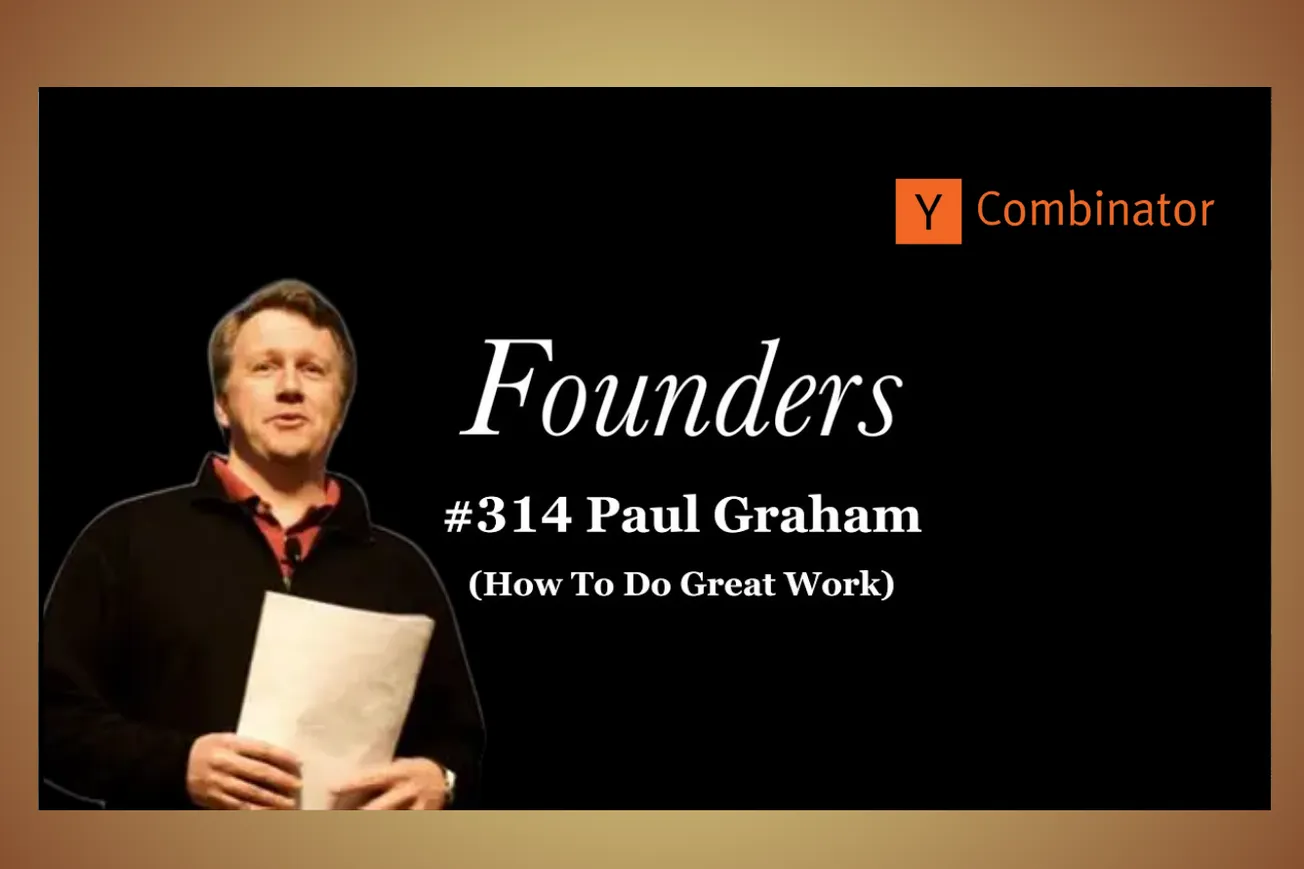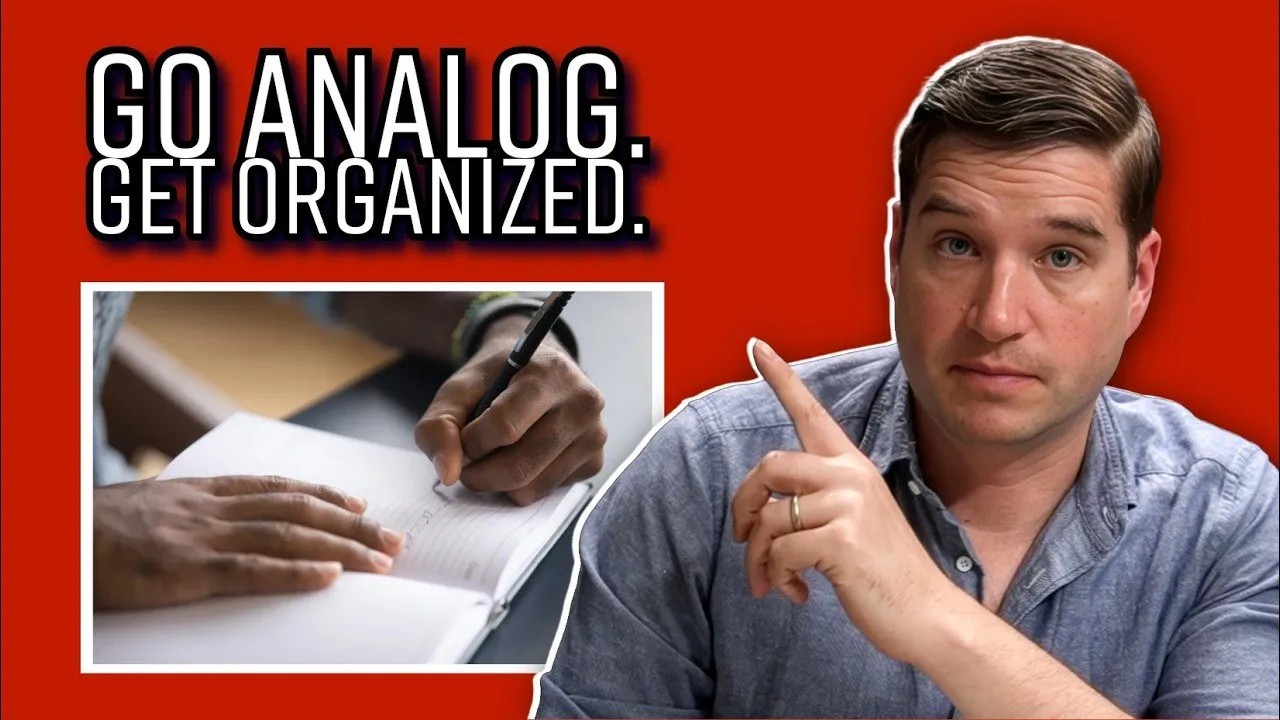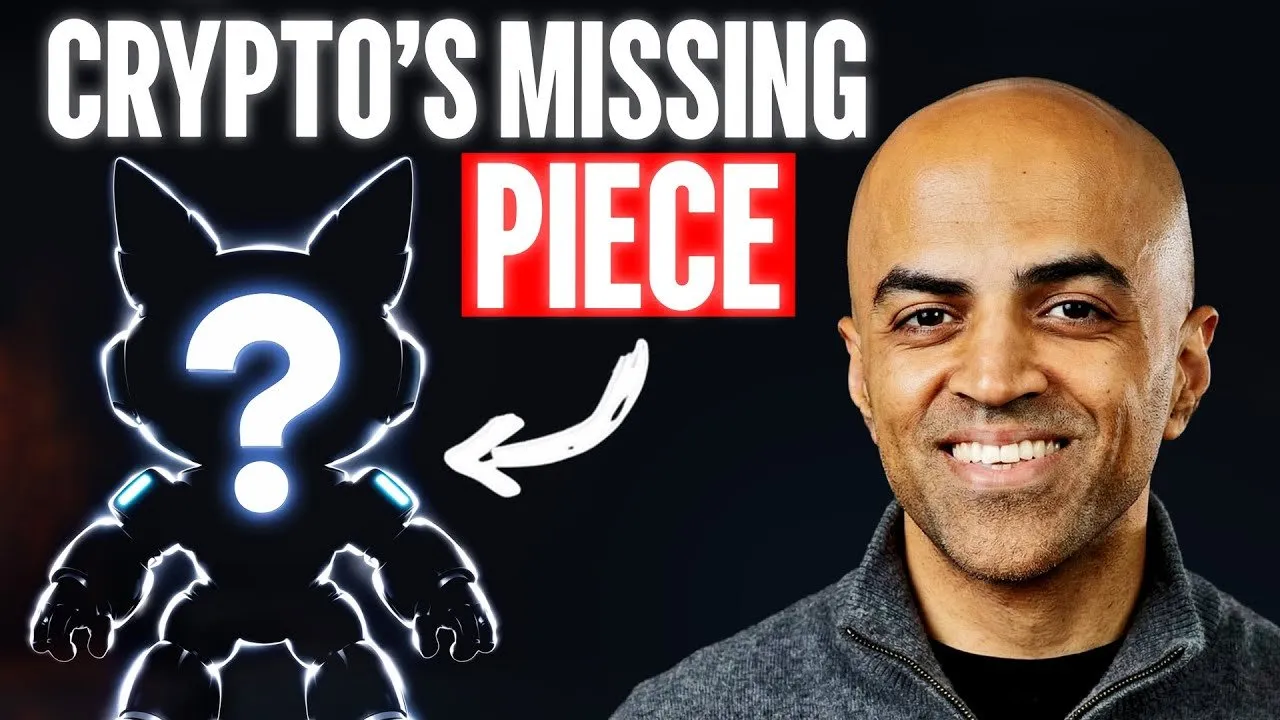Table of Contents
Y Combinator co-founder Paul Graham's definitive essay reveals the universal principles behind great work across all fields, from choosing what to work on to managing morale through setbacks.
Key Takeaways
- Great work requires three elements: natural aptitude, deep interest, and scope for meaningful contribution
- Curiosity serves as both the engine and rudder of great work, driving effort while revealing direction
- Learning what to work on happens through doing, not planning - you cannot predict what most work feels like without experience
- Following genuine interest provides immunity against distraction from prestige, money, fashion, and other people's expectations
- Getting to the frontier of knowledge in your field allows you to notice gaps that others take for granted
- Taste development through studying the best work in your field gives you clear targets for excellence
- Working with the right colleagues often makes the difference between doing great work and not
- Managing your morale becomes crucial since ambitious projects require sustained effort through inevitable setbacks
- Authenticity beats affectation - trying to seem impressive while working produces fake results that show
Timeline Overview
- 00:00–05:30 — The Three Requirements for Great Work: Paul Graham's recipe requiring natural aptitude, deep interest, and scope for great work, with emphasis on following genuine interest over worrying about importance
- 05:30–12:15 — Learning What to Work On Through Action: Why you cannot determine what work feels like without doing it, and how educational systems fail by forcing premature career commitments based on teenage guesses
- 12:15–18:45 — The Power of Curiosity and Interest: How excessive curiosity about topics that bore others becomes your competitive advantage, with examples from Mark Twain's accidental path to becoming America's greatest writer
- 18:45–25:30 — Getting to the Frontier of Knowledge: The four-step process of choosing a field, learning enough to reach the frontier, noticing gaps, and exploring promising opportunities
- 25:30–32:20 — Work Techniques and Focus Strategies: Managing energy through concentrated work blocks, the value of undirected thinking during walks and showers, and why finishing projects matters more than perfectionism
- 32:20–38:45 — Developing Taste and Authenticity: How studying the best work in your field develops judgment, why earnestness beats affectation, and the importance of intellectual honesty in seeing truth
- 38:45–45:15 — Breaking Rules and Independent Thinking: Two types of rule-breaking (aggressive and passive), why novices often make discoveries, and how unfashionable problems offer undervalued opportunities
- 45:15–52:30 — Starting Small and Evolving Ideas: The advantage of beginning with simple experiments that grow into something bigger, why being prolific increases discovery chances, and using youth's time advantage for exploration
- 52:30–58:45 — Learning from Other Fields: How copying ideas between distant fields creates breakthroughs, the importance of physical proximity to the best people in your field, and seeking out superior colleagues
- 58:45–65:00 — Managing Morale and Avoiding Intermediaries: Protecting your motivation as the basis of everything, building direct relationships with your audience, and choosing people who increase rather than decrease your energy
The Foundation: Three Requirements for Great Work
Paul Graham's analysis of great work across multiple fields reveals a consistent pattern requiring three essential elements. "The work you choose needs to have three qualities: number one it has to be something you have a natural aptitude for, number two you have to have a deep interest in it, and number three it offers the scope to do great work."
The third criterion proves less important than most people assume. Graham notes that "in practice you don't have to worry much about the third criteria. All you need to do is find something you have an aptitude for and a great interest in." This insight liberates people from paralysis about choosing "important" work, since importance often becomes apparent only in retrospect.
Graham's definition of great work itself removes artificial barriers: "Doing great work means doing something important so well that you expand people's ideas of what's possible. But there's no threshold for importance." This perspective shifts focus from external validation to personal excellence and innovation.
The intersection of aptitude and interest creates sustainable motivation that transcends temporary enthusiasm. "That sounds straightforward but it is often quite difficult. When you're young you don't know what you're good at and some kinds of work that you end up doing may not even exist yet." This uncertainty makes the discovery process itself crucial rather than the initial choice.
The framework provides direction without constraining possibilities, acknowledging that many future careers haven't been invented yet while giving clear criteria for evaluation once opportunities emerge.
Learning Through Action Rather Than Planning
Graham emphasizes that understanding what work truly involves requires direct experience rather than abstract planning. "The main reason it's hard is that you can't tell what most kinds of work are like except by doing them. You may have to work at something for years before you know how much you like it or how good you are at it."
This principle challenges conventional career advice that encourages extensive planning before action. "The way to figure out what to work on is by working. If you're not sure what to work on, guess. But pick something and get going. You'll probably guess wrong some of the time, but that is fine."
Educational systems compound this problem by forcing premature commitments. "Educational Systems in most countries expect you to commit to a field long before you could know what it's really like, which is madness. It would be better if they at least admitted that the system not only can't do much to help you figure out what to work on but is designed on the assumption that you'll somehow magically guess as a teenager."
The solution involves accepting uncertainty while maintaining forward momentum. "When it comes to figuring out what to work on, you're on your own. What you should not do is drift along passively assuming the problem will solve itself. You need to take action."
Mark Twain's career exemplifies this principle perfectly. His path from Sam Clemens to Mark Twain involved multiple false starts - aspiring to be a cocaine dealer, becoming a steamboat pilot, fleeing west during the Civil War, experiencing both tremendous success and devastating failure, contemplating suicide, then picking up a pen to write what he thought was "just a silly story" that launched his literary career.
The pattern reveals that great work often emerges from a series of seemingly unrelated experiences and chance encounters that couldn't have been planned but were made possible by consistent action and openness to opportunity.
Curiosity as Navigation System
Graham identifies curiosity as the most reliable guide for choosing what to work on, describing it as "both the engine and the rudder of great work. It will not only drive you but if you let it have its way will also show you what to work on."
The type of curiosity that leads to great work differs from casual interest. "What are you excessively curious about? Curious to a degree that would bore most other people? This is what you're looking for." This excessive curiosity provides sustainable motivation while indicating areas where you might have unique insights.
Curiosity serves as protection against external influences that lead people astray. "There are a lot of forces that will lead you astray when you're trying to figure out what to work on: pretentiousness, fashion, fear, money, politics, other people's interests. But if you stick to what you find genuinely interesting, you'll be proof against all of them. If you're interested, you're not astray."
The reliability of curiosity as a guide stems from its honesty. "Curiosity is the best guide. Your curiosity never lies, and it knows more than you do about what's worth paying attention to." This makes it superior to external measures like prestige or financial reward that may not align with personal strengths and interests.
Graham's own experience demonstrates this principle. When he felt excited about the "How To Do Great Work" essay despite having other planned projects, that excitement became the deciding factor. "I feel like I have Goosebumps right now I get excited and I'm like nope like it completely cleared everything off... when I people ask like how do I pick books or do I have like a schedule or something like that for what I'm going to work on I just go to a bookshelf... what am I most excited to learn about right now."
The practical application involves paying attention to what naturally captures your attention and following those threads even when they seem unimportant to others.
Reaching the Frontier of Knowledge
Graham outlines a four-step process for positioning yourself to do great work: "Choose a field, learn enough to get to the frontier, notice the gaps, explore promising gaps. This is how practically everyone who's done great work has done it, from painters to physicists."
Getting to the frontier requires substantial effort and sustained focus. "Steps two and four will require hard work... it may not be possible to prove that you have to work hard to do great things, but the empirical evidence is on the scale of the evidence for mortality." The work involved isn't optional but represents the price of admission to meaningful contribution.
Once at the frontier, you develop the ability to see opportunities others miss. "Many discoveries have come from asking questions about things that everyone else took for granted. If the answer seems strange to you, so much the better. Great work often has a tincture of strangeness."
The frontier position enables you to spot gaps that become opportunities for breakthrough work. "If you're excited about some possibility that everyone else ignores, and you have enough expertise to say precisely what they're all overlooking, that's as good of a bet as you will find."
This expertise must be substantial enough to provide credibility and insight. Surface-level knowledge allows you to see only what everyone else sees, while deep expertise reveals the subtle patterns and missing pieces that others overlook.
The process requires patience since reaching the frontier in any meaningful field typically takes years of concentrated effort. However, this investment creates the foundation for all subsequent breakthrough work.
Managing Work Techniques and Energy
Graham addresses the practical mechanics of sustaining high-quality work over time. "While you must work hard, it's possible to work too hard, and if you do that you'll find you get diminishing returns. Fatigue will make you stupid and eventually even damage your health."
Optimal work patterns vary by type of work and individual capacity. "The point at which work yields diminishing returns depends on the type. Some of the hardest types you might only be able to do four or five hours a day. Ideally those hours will be continuous."
Concentrated work blocks prove more valuable than scattered effort. Edwin Land's insight applies broadly: "My whole life has been spent trying to teach people that intense concentration for hour after hour can bring out in people resources they didn't know they had."
Graham also recognizes the importance of undirected thinking. "There's a kind of undirected thinking you do when walking or taking a shower or lying in bed that can be very powerful. By letting your mind wander a bit, you'll often solve problems you were unable to solve by frontal attack."
However, this wandering must be fed by focused work. "You have to be working hard in a normal way to benefit from this phenomenon though. You can't just walk around daydreaming. The daydreaming has to be interleaved with deliberate work that feeds its questions."
Protecting this valuable thinking time requires managing distractions carefully. "When you let your mind wander, it wanders to whatever you care about most at that moment. So avoid the kind of distraction that pushes your work out of the top spot, or you'll waste this valuable type of thinking on the distraction instead."
Developing Taste and Authentic Style
Graham emphasizes that developing excellent taste in your field provides essential direction for your own work. "Consciously cultivate your taste in the work done in your field until you know which is best and what makes it so. You don't know what you're aiming for... because if you don't try to be the best, you won't even be good."
Taste development requires extensive study of the highest quality work in your area. This study isn't passive consumption but active analysis of what makes exceptional work exceptional. Understanding the standards of excellence provides targets for your own efforts.
Authentic style emerges naturally from doing excellent work rather than from trying to be distinctive. "Don't try to work in a distinctive style. Just try to do the best job you can, and if you do, you won't be able to help doing it in a distinctive way." Forced distinctiveness typically results in affectation rather than genuine innovation.
Graham contrasts earnestness with affectation as the foundation of authentic work. "The best answer is earnest... The core of being earnest is being intellectually honest. You're trying to see more truth than others have seen so far... How can you have a sharp eye for truth if you're intellectually dishonest?"
Intellectual honesty requires facing uncomfortable truths about your work and your field. "Seeing the new idea usually requires you to change the way you look at the world. It's admitting to yourself that you have a broken model of the world... Most people do not want to see these clues. It would be an understatement to say that they're attached to their current model."
The practical application involves focusing on quality and truth rather than impression management. "If you succeed at an ambitious project, you're not a nobody. You're the person who did it. So just do the work and your identity will take care of itself."
Independent Thinking and Rule Breaking
Graham identifies two types of independent thinking that enable breakthrough work. "There are two ways to be comfortable breaking rules: to enjoy breaking them, or to be indifferent to them. I call these two cases being aggressively and passively independent-minded."
Aggressive independent thinkers "are the naughty ones. Rules don't merely fail to stop them; breaking rules gives these people additional energy. For this sort of person, delight at the sheer audacity of a project sometimes supplies them enough activation energy to get it started."
Passive independent thinking often comes from ignorance of established rules. "The other way to break rules is to not care about them, or perhaps not even know they exist. This is why novices and outsiders often make new discoveries; their ignorance of a field's assumptions acts as a source of temporary passive independent-mindedness."
Both approaches can lead to breakthrough work because new ideas typically violate existing assumptions. "A good new idea has to seem bad to most people, or someone would have already explored it." This means that conforming to established thinking patterns makes innovation unlikely.
The key insight about unfashionable problems reveals where opportunities hide. "Unfashionable problems are undervalued. Working on an unfashionable problem can be very pleasing. There's no hype or hurry. Opportunists and critics are both occupied elsewhere."
Most overlooked opportunities aren't explicitly unfashionable but simply don't seem as important as they actually are. "The most common type of overlooked problem is not explicitly unfashionable in the sense of being out of fashion. It just doesn't seem to matter as much as it actually does."
Henry Ford's work on internal combustion engines exemplifies this perfectly. In 1900, everyone told him he was wasting time because cars would obviously be electric or steam-powered. His boss at the electric company forced him to choose between his job and his engine experiments. Ford chose the engine, following his genuine interest despite universal skepticism, and 19 years later owned 100% of Ford Motor Company after manufacturing 15 million Model T cars.
Starting Small and Iterative Development
Graham advocates for beginning with manageable experiments rather than attempting grand projects immediately. "Big things start small. The initial versions of big things were often just experiments or side projects or talks, which then grew into something bigger. So start lots of small things."
This approach provides multiple advantages. Starting small reduces the activation energy required to begin while providing rapid feedback about whether an idea has merit. "Being prolific is underrated. The more different things you try, the greater the chance of discovering something new."
The iterative approach allows ideas to evolve beyond initial conception. "Great things are almost always made in successive versions. You start with something small and evolve it, and the final version is both cleverer and more ambitious than anything you could have planned."
This evolution happens through interaction with reality rather than abstract planning. "Begin by trying the simplest thing that could possibly work. Surprisingly often it does. Do not try to cram too much new stuff into any one version. Evolve instead."
The process requires accepting that many attempts will fail. "Understand though that trying lots of things will mean trying lots of things that do not work. You cannot have a lot of good ideas without also having a lot of bad ones."
Youth provides particular advantages for this experimental approach. "The advantages of youth are energy, time, optimism, and freedom... The best way to turn this time to advantage is to use it in a slightly frivolous way: to learn about something you don't need to know about just out of curiosity, or to try building something just because it would be cool."
However, experimentation must be distinguished from time-wasting. "Spend time lavishly when you're young, but don't simply waste it. There's a big difference between doing something you worry might be a waste of time and doing something you know for sure will be."
The Power of Environment and Colleagues
Graham emphasizes that great work rarely happens in isolation. "The degree to which great work happens in clusters suggests that one's colleagues often make the difference between doing great work and not." This makes choosing your environment and colleagues crucial strategic decisions.
Physical proximity to excellent people provides multiple benefits. "If a lot of the best people in your field are collected in one place, it's usually a good idea to visit for a while. It will increase your ambition, and also, by showing you that these people are human, increase your self-confidence."
Quality colleagues provide both challenge and support. "Most people who are very good at something are happy to talk about it with anyone who's genuinely interested. If they're really good at their work, then they probably have a hobbyist interest in it, and hobbyists always want to talk about their hobbies."
The influence works in both directions. "Colleagues don't just affect your work though; they also affect you. So work with people you want to become like, because you will." This makes colleague selection a form of self-design over time.
Graham provides a practical test for colleague quality: "How do you know when you have sufficiently good colleagues? In my experience, when you do, you know. Which means if you're unsure, you probably don't."
The advice extends to life partners as well. "Do not marry someone who doesn't understand that you need to work, or sees your work as competition for your attention. If you're ambitious, you need to work; it's almost like a medical condition."
Mark Twain received similar advice that shaped his entire career. An American diplomat in Hawaii told him: "You have great ability. I believe you have genius. What you need now is refinement of association. Seek companionship among men of superior intellect and character. Refine yourself and your work. Never affiliate with inferiors; always climb."
Managing Morale and Sustaining Effort
Graham identifies morale management as fundamental to sustained high performance. "Husband your morale. It is the basis of everything when you're working on ambitious projects. You have to nurture and protect it."
Morale creates compounding effects in both directions. "Morale compounds via work. High morale helps you do good work, which increases your morale and helps you do even better work. If you're not doing work, that can demoralize you and make it even harder to do good work."
This understanding suggests tactical approaches during difficult periods. "Since it matters so much for this cycle to be running in the right direction, it can be a good idea to switch to easier work when you're stuck, just so you start getting something done."
Setbacks represent one of the greatest threats to sustained morale. "One of the biggest mistakes ambitious people make is to allow setbacks to destroy their morale all at once, like a balloon popping. You can inoculate yourself against this by explicitly considering setbacks a part of your process."
The key involves maintaining perspective about the nature of difficult work. "Solving hard problems will always involve some backtracking. Never let setbacks panic you into backtracking more than you need to. It is not necessarily a bad sign if work is a struggle, any more than it's a bad sign to be out of breath while running."
Audience plays a crucial role in maintaining morale. "An audience is a crucial component of morale. If you're just starting out, a small but dedicated audience can be enough to sustain you. If a handful of people genuinely love what you're doing, that is enough."
However, intermediaries between you and your audience can damage this relationship. "Avoid letting intermediaries come between you and your audience. It is so liberating to escape it that you might be better off switching to an adjacent type of work if that work will let you go direct."
The people in your immediate environment significantly impact your energy and morale. "The people you spend time with will also have a big effect on your morale. Seek out the people who increase your energy and avoid those who decrease it."
Conclusion
Paul Graham's "How To Do Great Work" synthesizes universal principles from across disciplines into a coherent framework for pursuing meaningful achievement. The essay's central insight - that curiosity serves as both motivation and navigation system - provides reliable guidance through the complex process of finding and executing on important work. By emphasizing action over planning, authenticity over affectation, and sustained effort over sporadic brilliance, Graham offers a practical roadmap for anyone ambitious enough to pursue great work.
The framework requires courage to follow genuine interests despite external pressure, patience to develop expertise over years, and wisdom to recognize that great work emerges from the intersection of personal passion and persistent effort rather than from abstract planning or conformity to others' expectations.
Practical Implications
- Follow your excessive curiosity about topics that bore others, as this indicates where you might have unique insights and sustainable motivation
- Learn what work actually involves through direct experience rather than abstract planning, accepting that you may need several years to understand your fit
- Get to the frontier of knowledge in your chosen field by studying extensively, then look for gaps and assumptions others take for granted
- Protect your morale as the foundation of sustained effort, treating setbacks as part of the process rather than signs of failure
- Develop taste by studying the best work in your field until you understand what makes excellence excellent
- Start small with experiments and side projects rather than attempting grand plans, allowing ideas to evolve through iteration
- Seek out the best colleagues and environment possible, as proximity to excellence often determines whether you do great work or not
- Maintain direct relationships with your audience rather than allowing intermediaries to filter communication
- Choose work that aligns with your authentic interests rather than chasing prestige, money, or others' expectations of importance
- Use youth's advantages of time and energy for exploration while accepting that finding your path requires patience and persistent experimentation





